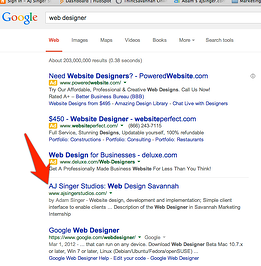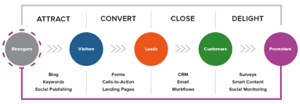Lead Generation Using PPC Ads: Beginners Tips For CROs
Your Contract Research Organisation (CRO) has so much to offer, but generating quality leads can be a real challenge. The big problem CROs face with lead generation is how to create awareness that your business exists, and that the services you provide meet all your sponsor’s requirements.
 There are many offline ways to connect with leads, such as trade shows and industry-relevant talks. It can be daunting to try to find such a niche audience online. But the brilliance of search engines like Google is that your potential sponsors are already there, looking for you and searching for your services! Unlike social media platforms where the users are primarily there for leisure, search engine users are already identifying their business’s problem, and are actively seeking solutions. Google gets 3.5 billion searches a day so its search engine result pages are prime real estate for lead generation.
There are many offline ways to connect with leads, such as trade shows and industry-relevant talks. It can be daunting to try to find such a niche audience online. But the brilliance of search engines like Google is that your potential sponsors are already there, looking for you and searching for your services! Unlike social media platforms where the users are primarily there for leisure, search engine users are already identifying their business’s problem, and are actively seeking solutions. Google gets 3.5 billion searches a day so its search engine result pages are prime real estate for lead generation.
How can you make sure prospective sponsors find you?
 For your prospective sponsors to find you, you have to show up in their search engine result page (SERP). This can happen when you rank highly, due to your SEO (search engine optimisation) efforts. But you can also amplify your CRO’s reach by strategic PPC advertising. PPC refers to pay-per-click ads that show up on a search engine result page. PPC advertising allows businesses to showcase their services to those searching for specific relevant keywords. The business only pays if the searcher clicks on the ad. Google then employs an algorithm to decied where your ad will be located on a SERP -which will factor in the amount of money you have bid in the ad auction, ie. how much money you are willing to pay for your ad to be associated with specific keywords.
For your prospective sponsors to find you, you have to show up in their search engine result page (SERP). This can happen when you rank highly, due to your SEO (search engine optimisation) efforts. But you can also amplify your CRO’s reach by strategic PPC advertising. PPC refers to pay-per-click ads that show up on a search engine result page. PPC advertising allows businesses to showcase their services to those searching for specific relevant keywords. The business only pays if the searcher clicks on the ad. Google then employs an algorithm to decied where your ad will be located on a SERP -which will factor in the amount of money you have bid in the ad auction, ie. how much money you are willing to pay for your ad to be associated with specific keywords.
There are simple strategies to ensure you get the most out of PPC advertising campaign:
 Target your specific audience
Target your specific audience
As a CRO your ideal audience is very niche. Develop a profile for the sponsor you are aiming to attract, based on demographics, industry, income, education levels…. Even what department they work in! The ways you can target are endless. The more specific you are, the better your ads will perform, as click-through and conversion rates will rise.
Choose your keywords wisely
 Your ad should contain the keywords that best match the intentions of your prospective sponsor. Choose which keywords to bid on strategically for the best ROI, and to keep the budget in check. Since you need to bid for specific keywords, consider that the more searched for keywords will be more expensive. Picking a lower volume keyword may be healthier for your budget but still ensure your business comes up when sponsors are looking for your CRO services. One way of doing this is focusing on long tail keywords. This means a group of 3 or more words used as a phrase in a search. Long tail keywords are often cheaper to bid on, but can attract a more serious lead. A great way to find long tail keywords is by adding the services you offer - for example research and development - to the industry you are seeking to attract, like bio pharma companies.
Your ad should contain the keywords that best match the intentions of your prospective sponsor. Choose which keywords to bid on strategically for the best ROI, and to keep the budget in check. Since you need to bid for specific keywords, consider that the more searched for keywords will be more expensive. Picking a lower volume keyword may be healthier for your budget but still ensure your business comes up when sponsors are looking for your CRO services. One way of doing this is focusing on long tail keywords. This means a group of 3 or more words used as a phrase in a search. Long tail keywords are often cheaper to bid on, but can attract a more serious lead. A great way to find long tail keywords is by adding the services you offer - for example research and development - to the industry you are seeking to attract, like bio pharma companies.
 The flipside is which negative words to exclude. The more specific your CRO is, the more you want to make sure you are not ending up paying for clicks from leads who aren’t really looking for what you offer. Google doesn’t understand the nuances of your market, but you do. Excluding negative keywords associated with similar services (but not ones that you offer) will be better for your budget and ensure you are getting qualified leads.
The flipside is which negative words to exclude. The more specific your CRO is, the more you want to make sure you are not ending up paying for clicks from leads who aren’t really looking for what you offer. Google doesn’t understand the nuances of your market, but you do. Excluding negative keywords associated with similar services (but not ones that you offer) will be better for your budget and ensure you are getting qualified leads.
Pay attention to the keywords your competitors are using to see if the language they use better matches the searcher’s intent.
Create PPC Ads that correspond with the buyer journey
 Distinguish between the different stages of the buyer journey. If you imagine a funnel, your lead begins at the top - at initial stages of awareness of identifying their problem. Further down the funnel, they are researching what their options for solving their problem are, and considering which route to take. Only once they have spent time educating themselves about the various products and services on offer, do they reach the commitment stage where a lead can become a sponsor.
Distinguish between the different stages of the buyer journey. If you imagine a funnel, your lead begins at the top - at initial stages of awareness of identifying their problem. Further down the funnel, they are researching what their options for solving their problem are, and considering which route to take. Only once they have spent time educating themselves about the various products and services on offer, do they reach the commitment stage where a lead can become a sponsor.
How does understanding this funnel affect your PPC ads? If you try to target all these groups simultaneously, it will result in a confused approach, which doesn’t adequately help any of them. Create different campaigns with PPC ads that correspond with the different stages. This will also help you gain more data on your leads, as knowing what ads they click on associates them with the stage they are at.
PPC Ads that work for the B2B industry
Offer content-rich, buyer oriented material such as white papers, case studies, and new developments you are working on. Here is where the B2B industry needs to operate differently from the B2C model. When advertising to a consumer, a sale or exciting deal can drive business. In contrast, the Bio pharma companies, investors or Government organisations looking for you are contemplating a long term contract and an ongoing relationship with your company. Offer them something of significant value to match the commitment you are asking them to consider.

The best practices for PPC ads like adding a clear call to action (CTA) still apply, but substitute consumer-friendly directives like “buy now” with “book a consultation”, “download our price guide” or “contact us”, which are more applicable for a business seeking a CRO.
PPC Ads - if utilised correctly - can be a great source of lead generation. Once you have done your research and implemented the strategies above, your PPC ads should be an effective way of finding highly attractive future sponsors.
Your Articles Need SkimCatchables
Skim-Catchables are bloggers' - now- not-so- secret weapon to make readers' jobs easier because they can easily skim down a page and find the answer to what they are looking for. Engaging titles and subtitles, gorgeous infographics, and functions like TL; DR (Too long; didn’t’ read) not only help readers, but should be part of any writer's tool kit!
Topic #AdWords,#Google Search,#Generating Leads,#tips
Leave us
a Comment!